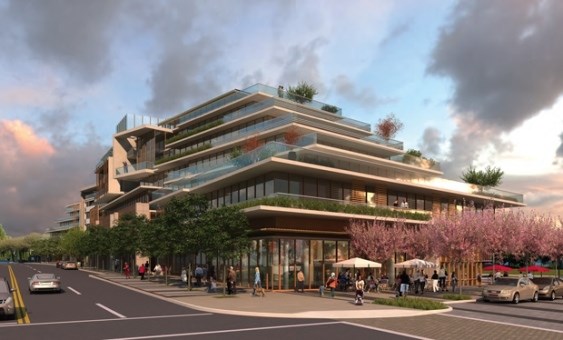The last words that West Vancouver council members can legally consider about the proposed Grosvenor development have been said.
More than 50 speakers approached the mic over four hours at the official public hearing Thursday night to share their passionate but disparate views on the divisive redevelopment of the 1300-block of Marine Drive.
Grosvenor has applied to build 98 condo units, 37,000 square feet of retail space and 55,000 square feet of office space in six-and seven-storey towers on the south side of Marine Drive, which would require buying the land where the West Vancouver Police Department now sits. Council has signalled it will spend the proceeds on building a new police headquarters and fire hall in a $37-million public safety building next to municipal hall.
The debate that played out for the 100-plus attendees to Thursday's meeting pitted competing values against each other: revitalization versus preserving village character, the allure of acquiring the public safety building without costing taxpayers versus the loss of views for Lower Ambleside residents.
Clive Bird, a retired lawyer and former chairman of the West Vancouver school board, encapsulated the pro-Grosvenor argument, saying the development is essential to turning around a decaying Ambleside.
"I believe that the revitalization of Ambleside is essential. West Vancouver has the potential to be a world-class ocean-side community," he said, adding praise for Grosvenor and the changes the developer has made to the project after public feedback.
"Now it's time to get on with it. If we don't go forward with it, much as I hate to say it, Ambleside will continue to wither and die. We can't just stand still and cling to the present. Cities all over the world go through this kind of change every day. It's part of maturing as a community."
That position was also taken by the West Vancouver Chamber of Commerce.
The main points hammered on by opponents were that, at six and seven storeys, the Grosvenor towers would be too big, that council should reject the notion of selling the land when it would be in the public interest to keep it as a long-term asset, and that the public process was slanted in Grosvenor's interest from the start.
Ambleside, they argue, isn't in nearly the terminal condition that Grosvenor supporters say it is.
"I walk in Ambleside every day. I shop in Ambleside. I bank in Ambleside.. .. Ambleside is alive and well. It's not withering. It's not dying. It's a vibrant community with residents who walk the streets," said Elaine Fonseca, an Ambleside Dundarave Ratepayers Association director, before admonishing council for believing the only way it could pay for a new public safety building is through selling land and allowing a seven-storey building on the property.
"If we are buying into this financial mantra, we are selling out our community to more traffic, less parking and a loss of our community character and spirit. This proposal is too massive and we are selling out the character and a way of life."
The proposal was particularly unpopular with residents of Keith Road, Clyde Avenue, and Duchess Avenue on the north side of Marine Drive. Several said they would rather pay for the public safety building with an increase in taxes than a land sale.
Council faced demands from attendees who wanted to know why the district never sought other potential buyers or proposals for the land where the West Vancouver Police Department now sits. Those questions were typically followed by requests that council hold a referendum on the Grosvenor development.
As the night wore down, opponents of the development began to target their pleas to Coun. Bill Soprovich, who after earlier reticence to Grosvenor's plan, voted earlier in the year with the majority to allow the needed change to the official community plan, and is largely seen as the only swing vote on a split council.
Council will now consider the comments delivered Thursday night along with more than 500 letters and emails on the subject. The vote has not been scheduled.



